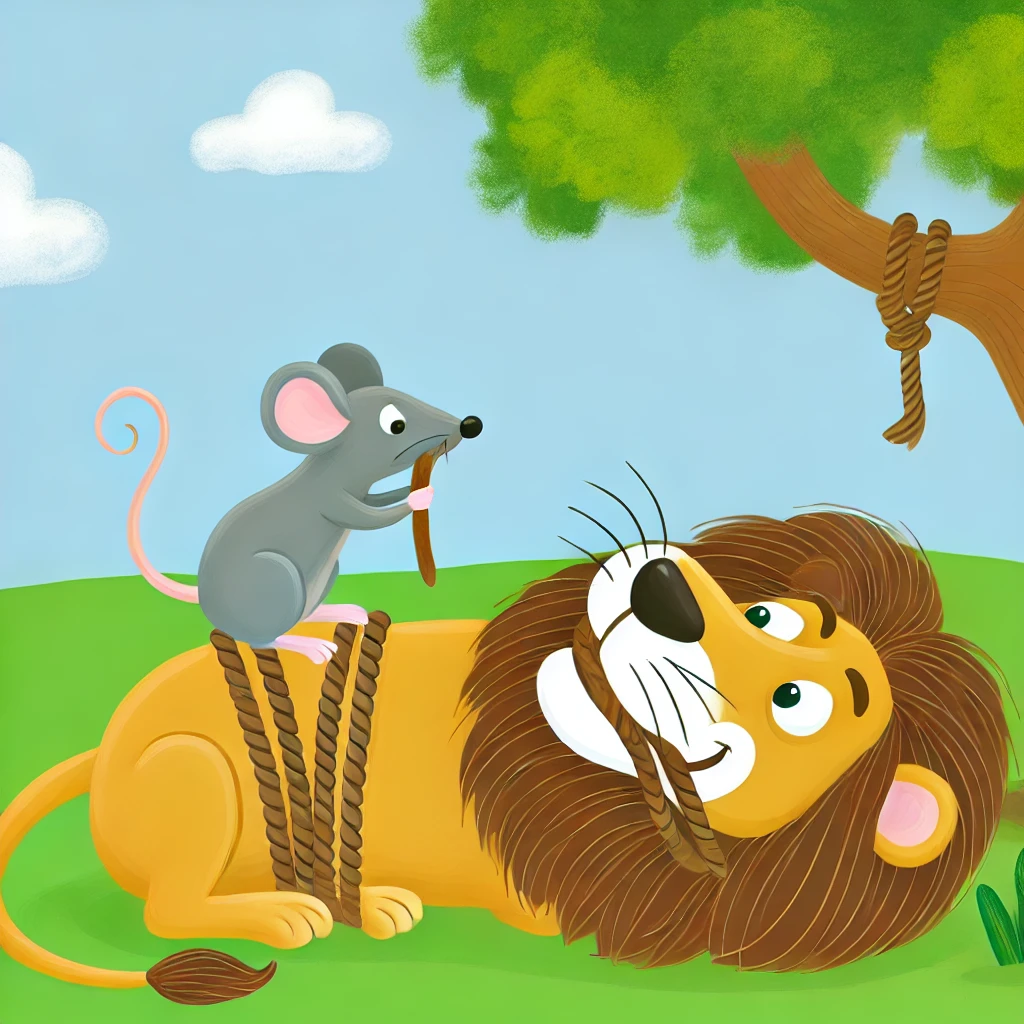Once, a Lion was sleeping when a little Mouse started running on him. This woke up the Lion, who put his big paw on the Mouse and opened his mouth to eat him. “Please forgive me, O King,” the Mouse cried. “If you let me go, I will never forget it. Maybe one day I can help you.” The Lion laughed at the idea of the Mouse helping him, but he lifted his paw and let the Mouse go.
Some time later, the Lion was caught in a trap. The hunters tied him to a tree while they went to find a wagon to take him away. Just then, the little Mouse passed by. Seeing the Lion in trouble, the Mouse quickly gnawed through the ropes and set the Lion free. “Didn’t I tell you?” said the little Mouse.
Even small friends can be great friends.
Lion – ライオン
Sleeping – 眠っている
Little – 小さな
Mouse – ネズミ
Running – 走っている
Woke up – 目を覚ました
Big paw – 大きな足
Mouth – 口
Eat – 食べる
Forgive – 許す
King – 王様
Cried – 叫んだ
Let go – 解放する
Laugh – 笑う
Idea – 考え
Helping – 助ける
Trap – 罠
Hunters – 狩人たち
Tied – 縛った
Tree – 木
Find – 見つける
Wagon – ワゴン
Passed by – 通りかかった
Trouble – 困っている
Quickly – 素早く
Gnawed – かじった
Ropes – 縄
Free – 自由にする
Small – 小さな
Great – 偉大な
1. Once, a Lion was sleeping when a little Mouse started running on him.
- Once: 副詞。「かつて」「ある時」という意味で、物語の導入に使われます。
- a Lion was sleeping: 主語「a Lion」+動詞「was」+現在分詞「sleeping」で、過去進行形を作り、「ライオンが眠っていた」という意味です。
- when: 接続詞。「〜の時」という意味で、過去進行中の出来事に割り込む形で別の動作が始まることを示しています。
- a little Mouse started running: 主語「a little Mouse」+動詞「started」+現在分詞「running」で、「小さなネズミが走り始めた」という意味です。
- on him: 前置詞句。「on(〜の上に)」+代名詞「him(彼)」で、「彼の上を」という意味です。
2. This woke up the Lion, who put his big paw on the Mouse and opened his mouth to eat him.
- This: 代名詞。直前の出来事を指し、「これが」という意味です。
- woke up the Lion: 動詞「woke up」は「wake up(目を覚ます)」の過去形。「ライオンを目覚めさせた」という意味です。
- who put his big paw on the Mouse: 関係代名詞「who」が「the Lion」を修飾しています。「put」は動詞「置く」の過去形、「his big paw(彼の大きな足)」を「the Mouse(ネズミ)」に置いたことを示しています。
- and opened his mouth to eat him: 動詞「opened」+目的語「his mouth」で「口を開けた」という意味です。「to eat him」は不定詞句で「彼を食べるために」という目的を表します。
3. “Please forgive me, O King,” the Mouse cried.
- Please forgive me: 命令形。「please」は丁寧な表現を作り、「許してください」という意味です。
- O King: 呼びかけの表現。「O」は古典的な呼びかけで、「王様よ」という意味です。
- the Mouse cried: 主語「the Mouse(ネズミ)」+動詞「cried(叫んだ)」の過去形。
4. “If you let me go, I will never forget it. Maybe one day I can help you.”
- If you let me go: 条件節。「if」は「もし〜なら」という意味で、「let」は「許す」という意味です。「you let me go」は「私を行かせてくれるなら」という意味になります。
- I will never forget it: 主語「I」+助動詞「will」+動詞「forget」で「決して忘れない」という意味です。「never」は否定を強調しています。
- Maybe one day I can help you: 「Maybe one day」は「いつかもしかしたら」を表し、主語「I」と助動詞「can(できる)」+動詞「help(助ける)」で「あなたを助けることができるかもしれない」という意味です。
5. The Lion laughed at the idea of the Mouse helping him, but he lifted his paw and let the Mouse go.
- The Lion laughed: 主語「The Lion(ライオン)」+動詞「laughed(笑った)」の過去形。
- at the idea of the Mouse helping him: 前置詞「at(〜に対して)」+名詞「the idea(考え)」を修飾する形で「of the Mouse helping him(ネズミが彼を助けるという考え)」が続きます。
- but he lifted his paw: 接続詞「but(しかし)」で逆接が示され、「lifted」は動詞「lift(持ち上げる)」の過去形、「his paw(彼の足)」を持ち上げたという意味です。
- and let the Mouse go: 動詞「let(許す)」の過去形+目的語「the Mouse(ネズミ)」+動詞「go(行く)」の原形で、「ネズミを解放した」という意味です。
6. Some time later, the Lion was caught in a trap.
- Some time later: 副詞句で「しばらくして」という意味です。
- the Lion was caught: 受動態。「was caught」は「捕まった」という意味です。
- in a trap: 前置詞句。「in」は「〜の中に」という意味で、「a trap(罠)」の中で捕まったことを示します。
7. The hunters tied him to a tree while they went to find a wagon to take him away.
- The hunters tied him to a tree: 主語「The hunters(ハンターたち)」+動詞「tied(縛った)」の過去形。「him(彼)」を「a tree(木)」に縛ったことを示します。
- while they went to find a wagon: 接続詞「while(〜している間に)」+主語「they(彼ら)」+動詞「went(行った)」の過去形+不定詞「to find(見つけるために)」で「彼らがワゴンを見つけに行っている間」という意味です。
- to take him away: 不定詞句で目的を示し、「彼を連れて行くために」という意味です。
8. Just then, the little Mouse passed by.
- Just then: 副詞句で「ちょうどその時」という意味です。
- the little Mouse passed by: 主語「the little Mouse(小さなネズミ)」+動詞「passed by(通りかかった)」の過去形。
9. Seeing the Lion in trouble, the Mouse quickly gnawed through the ropes and set the Lion free.
- Seeing the Lion in trouble: 現在分詞「Seeing(見て)」が「the Mouse(ネズミ)」の補足説明をし、「ライオンが困っているのを見て」という意味です。
- the Mouse quickly gnawed through the ropes: 主語「the Mouse(ネズミ)」+動詞「gnawed through(かじり切った)」の過去形。「the ropes(縄)」をかじり切ったことを示します。「quickly」は副詞で「素早く」という意味です。
- and set the Lion free: 動詞「set(解放した)」の過去形+目的語「the Lion(ライオン)」+補語「free(自由に)」で「ライオンを自由にした」という意味です。
10. “Didn’t I tell you?” said the little Mouse.
- Didn’t I tell you?: 助動詞「Did」と動詞「tell(言う)」の原形を使った疑問文。「Did not」の短縮形「Didn’t」を使い、「言ったでしょう?」という意味です。
- said the little Mouse: 主語「the little Mouse(小さなネズミ)」+動詞「said(言った)」の過去形。倒置表現でセリフの後に動詞が来ています。
11. Even small friends can be great friends.
- Even small friends: 主語。「Even」は強調で「小さな友達でも」という意味です。
- can be: 助動詞「can(〜できる)」+動詞「be(〜である)」で「〜であることができる」という可能性を表します。
- great friends: 名詞句。「great(偉大な)」+「friends(友達)」で「偉大な友達」を意味します。



コメント